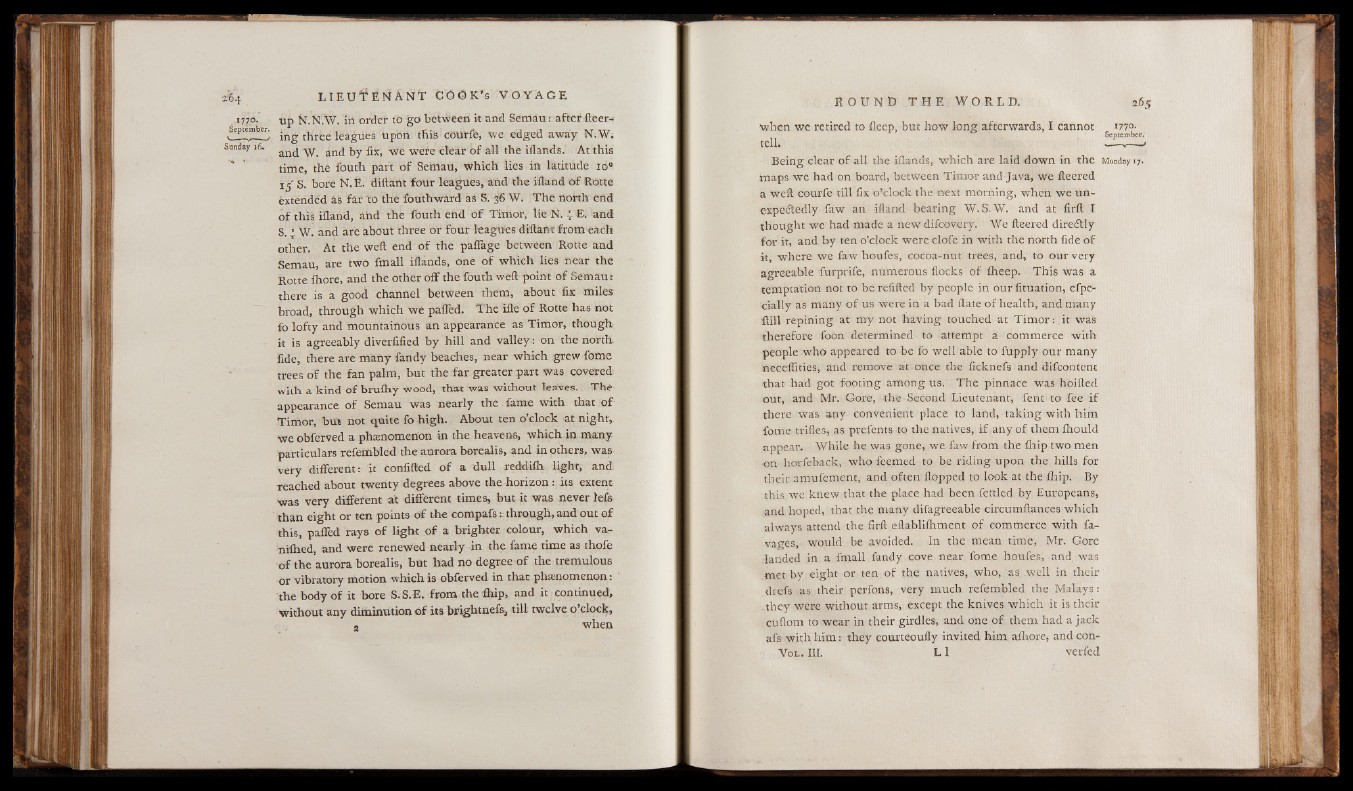
,1770. up N.N.W. in order tb go between it and Semau: afterfleer-
September. . tfirEe leagues upon this courfe, we edged away N.W.
Sunday »6. an(j by fix, we were clear of all the iflands. At this
time, the fouth part of Semau, which lies in latitude io°
15' S. bore N. E. diftaUt four leagues, and the ifland of Rotte
Extended as far to the fouthward as S. 36 W. The north end
of this ifland, and the fouth end of Timor, lie N. i E, and
S. ■ \V. and are about three or four leagues diftant from each
other. At the weft end of the paffage between Rotte and
Semau, are two fmall iflands, one of which lies near the
Rotte Ihore, and the other off the fouth weft point of Semau:
there is a good channel between them, about fix miles
broad, through which we palled. The ille of Rotte has not
fo lofty and mountainous an appearance as Timor, though
it is agreeably diverfified by hill and valley: on the north
fide, there are many fandy beaches, near which grew fome
trees of the fan palm, but the far greater part Was covered
with a kind of brulhy wood, that was without leaves. The
appearance of Semau was nearly the fame with that of
Timor, but not quite fo high. About ten o’clock at night,.
We obferved a phenomenon in the heavens, which in many
particulars refembled the aurora borealis, and in others, was
very different: it confifted of a dull reddifh light, and
reached about twenty degrees above the horizon: its extent
was very different at different times, but it was never lefs
than eight or ten points of the compafs:.- through, and out o f
this, paffed rays of light of a brighter colour, which vanished,
and were renewed nearly in the fame time as thofe
of the aurora borealis, but had no degree of the tremulous
or vibratory motion which is obferved in that phenomenon:
the body of it bore S.S.E.. from theihip, and it continued,
without any diminution of its brightnefs, till twelve o’clock,
2 when
when we retired to fleep, but how long afterwards, I cannot ' 77°-
September,
tell. J -v— •
Being clear of all the iflands, which are laid down in the Monday 17.
maps we had on board, between Timor and-Java, we fleered
a weft courfe till fix o ’clock the next morning, when we unexpectedly
faw an ifland bearing W. S. W. and at firft I
thought we had made a new difcovery. We fleered direCtly
for it, and by ten o’clock were clofe in with the north fide of
it, where we faw houfes, cocoa-nut trees, and, to our very
agreeable furprife, numerous flocks of Iheep. This was a
temptation not to be refilled by people in our fituation, efpe-
cially as many of us were in a bad ftate of health, and many
flill repining at my not having touched at Timor: it was
therefore foon determined to attempt a commerce with
people who appeared to be fo well able to fupply our many
neceflitieSj and remove at once the ficknefs and difcontent
that had got footing among us. The pinnace was hoifted
out, and Mr. Gore, the Second Lieutenant, fent to fee if
there Was any convenient place to land, taking with him
fome trifles, as prefents to the natives, if any of them Ihould
appear. While he was gone, we faw from the fhip two men
on horfeback, who feemed to be riding upon the hills for
their amufement, and often flopped to look at the lhip. By
this we knew that the place had been fettled by Europeans,
and hoped, that the many difagreeable circumftances which
always attend the firft eftablilhment of commerce with ravages,
would be avoided. In the mean time, Mr. Gore
landed in a fmall fandy cove near fome houfes, and was
met by eight or ten of the natives, who, as .well in their
drefs as their perfons, very much refembled the Malays:
they were without arms, except the knives which it is their
cuftom to wear in their girdles, and one of them had a jack
afs with h im: they courteoully invited him afhore, and con-
Vol. III. L 1 verfed